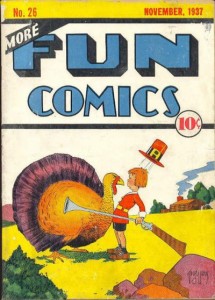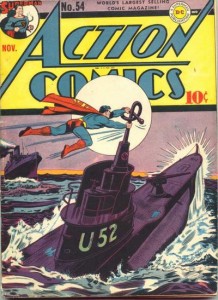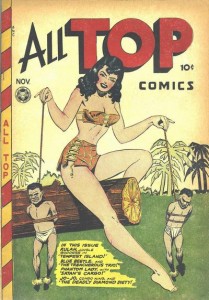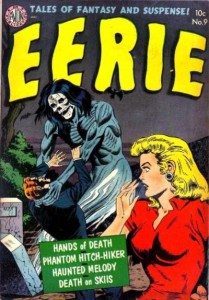Over the years it’s been fun to go back and look at the evolution of comic books from the pre-Golden Age years (some call the Platinum Age) through the start of the Silver Age. There’s no doubt that comic books during this period changed drastically. This evolution generally reflected the prevailing political or social mood, but also what the publishers concluded would sell more issues. At first, humor sold books (in the form of repackaged newspaper strips) which gave way to the most popular of all genres, the superheroes. Even these seemingly indestructible heroes couldn’t last forever, and eventually war, crime, romance, western, horror and science fiction wrested control of the newsstands and spinner racks. Ultimately, after much investigation and self-regulation, the superheroes were back to kick off the Silver Age of Comic Books, but in a much different light.
So, how did these changes appear to the comic book buying public? From month to month, the changes were likely subtle, but taking a snapshot of available issues every five years or so offers a good glimpse into the state of the industry at that time. With this in mind, I thought it would be an interesting exercise to see what was available on the stands from select publishers each month for certain yearly intervals. To kick this off, I have looked at the majority of comics published in November 75, 70, 65 and 60 years ago. This will by no means detail every comic book that could be purchased, but it should provide a good general overview of what the major publishers were offering at the time.
November 1937 – 75 Years Ago
While not actually in the Golden Age, November of 1937 was certainly close (Superman kicked off the Golden Age in Action Comics #1 in June of 1938). Not surprisingly, there were few new comic books on the stands in November of 1937. Quality Comics offered Feature Funnies #2, Western Publishing offered Mickey Mouse Magazine volume 3, number 2 (issues #26), and DC gave us More Fun Comics #26. Not much to choose from here!
November 1942 – 70 Years Ago
What a difference five years can make! The Golden Age comic book explosion was well under way in 1942, the peak of the Golden Age of comic books. Following is a list by selected publisher of comics published in November 1942:
Archie Comics – Pep Comics #33, Top-Notch Laugh Comics #30, Zip Comics #31
DC Comics – Action Comics #54, Adventure Comics #80, All-American Comics #44, All-Flash #7, Detective Comics #69, Flash Comics #35, More Fun Comics #85, Sensation Comics #11, Star Spangled Comics #14, Superman #19
Dell – Looney Tunes and Merrie Melodies Comics #13, Walt Disney’s Comics & Stories #26
Fawcett – America’s Greatest Comics #4, Bulletman #9, Captain Marvel Adventures #17, Captain Marvel, Jr. #1, Captain Midnight #2, Gene Autrey Comics #3, Master Comics #32, Spy Smasher #8, Whiz Comics #37
Timely/Marvel – Captain America Comics #20, Marvel Mystery Comics #37
Fiction House – Jungle Comics #35, Planet Comics #21
Quality – Crack Comics #26, Feature Comics #62, Military Comics #13, National Comics #26, Smash Comics #37
Standard – America’s Best Comics #3, The Fighting Yank #2, Thrilling Comics #31
November 1947 – 65 Years Ago
While not as big a change as between 1937 and 1942, there are still some noticeable differences. Notably, Fox has entered the fray with a number of comic magazines. Crime and jungle themes were slowly loosening the superhero’s strangle hold. Again, these lists only reflect new issues published in November of the stated year, and not all comics that were being published and available at the time.
DC Comics – Action Comics #114, All Funny Comics #20, All-American Comics #91, Batman #43, Boy Commandos #24, Detective Comics #129, Flash Comics #89, Funny Stuff #27, Sensation Comics #71, Star Spangled Comics #74, Superman #49, Wonder Woman #26
Dell – Looney Toones and Merrie Melodies Comics #73, Our Gang Comics #39, Our Gang with Tom and Jerry #40, Walt Disney’s Comics & Stories #86, Walter Lantz Funnies #129
Fawcett – Captain Marvel Adventures #78, Captain Marvel, Jr. #55, Captain Midnight #57, Mary Marvel #18, Master Comics #85, Wow Comics #60
Timely/Marvel – Georgie Comics #13, Miss America Magazine v7, #4 (#37)
Fiction House – Jumbo Comics #105, Planet Comics #51
Fox – All Top Comics #8, Blue Beettle #50, Jo-Jo #8, Junior #10, Zoot Comics #10
Quality – Crack Comics #51, Feature Comics #116, Hit Comics #49, Modern Comics #67, Police Comics #72
November 1952 – 60 Years Ago
The superheroes were on their last leg as western, crime, war, horror and other genres took over. There’s a significant change in available comics over the last five years. Publishers like EC, Avon and ACG have taken the forefront with many of their titles.
American Comics Group – Adventures into the Unknown #37, Forbidden Worlds #11, The Hooded Horseman #26, Operation: Peril #13, Out of the Night #5
Avon – Eerie #9, Jesse James #9, Realistic Romances #8, U.S. Tank Commandos #3, Wild Bill Hickok #13
DC Comics – Action Comics #174, The Adventures of Rex the Wonder Dog #6, Batman #73, Big Town #18, Detective Comics #189, Funny Stuff #69, Girl’s Love Stories #20, House of Mystery #8, Mr. District Attorney #30, Our Army at War #4, Superman #79, Tomahawk #14, Western Comics #36
Dell – Bugs Bunny’s Christmas Funnies #3, The Cisco Kid #12, Donald Duck #26, Porky Pig #25, Tarzan #38, Tom & Jerry Comics #100, Walt Disney’s Christmas Funnies #189
EC Comics – Frontline Combat #9, Haunt of Fear #16, Two-Fisted Tales #30, Weird Fantasy #16, Weird Science #16
Fawcett – Captain Marvel Adventures #138, Captain Marvel, Jr. #115, The Marvel Family #77, Whiz Comics #151
Fiction House – Fight Comics #83, Jungle Comics #155
Timely/Marvel/Atlas – Combat #6, Combat Kelly #7, Man Comics #20, Millie the Model #37, Miss America Magazine #48, Spellbound #9, War Combat #5, War Comics #13
Quality – Blackhawk #58, Plastic Man #38, T-Man #8
I’ve enjoyed surveying the comics that were published in the month of November during the selected yearly intervals. I plan to survey other months from time to time, keeping the same five year intervals in place. I welcome any comments or observations about this very interesting glimpse into the publishing trends that developed during the Golden Age of comic books.





